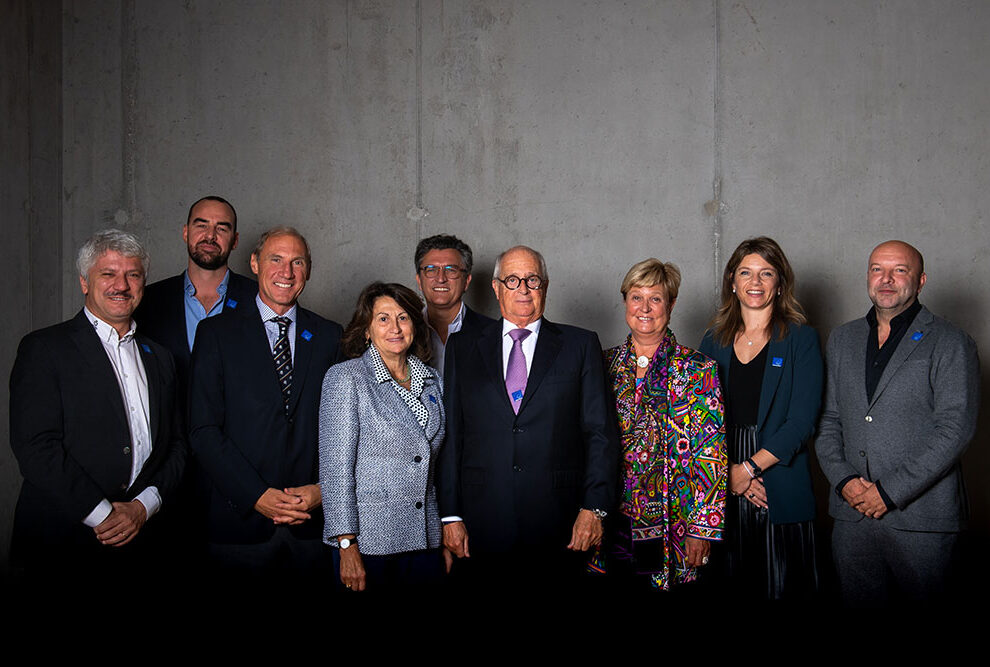
EEF General Assembly 2022: a historic new voting system, new board members and updates on the development of the EEF
6 October 2022On 12 September the European Equestrian Federation met in Warsaw, Poland for its General Assembly. The meeting was held against the backdrop of the Longines EEF Series Final, which took place on the 11th and showcased one of the EEFs successes in creating the Series. The meeting was attended by 27 member states, with additional 11 proxy votes submitted.
The General Assembly, held on Monday 12 September, began with a welcome from President Theo Ploegmakers who noted the significance of being together, following the previous years of covid, and the importance of the topics available for discussion in the day’s agenda. The initial formalities were then quickly handled with the approval of the agenda and 2021 minutes and the affiliation of Bosnia and Herzegovina (BIH) and Malta (MLT) to the EEF.
The Annual Report of the Board was then presented, in which the work of the board was outlined, with significant activity in sports development and the areas of social licence alongside the continuing factors of Covid and the Ukrainian crisis. The full report has previously been shared and is available for members to download here.
The Sport Development update, presented by board member Quentin Simonet, was well received. Considerable efforts have been made in this area to develop the new EEF Evolution competition for Jumping and Dressage, which focus on providing more team competition formats, and allowing mixed nation teams, whilst creating opportunities for officials to develop. There were also updates on new FEI solidarity projects for 2023.
Next Nadia Kolodchenko, chair of the newly formed EEF Sustainability Working Group, gave a presentation on the group’s work to date. Formed in April, the group is made up of independent sustainability experts, NF member representatives and event OCs. After initially outlining the current climate crisis, Nadia outlined the group’s current working priorities which include bringing sustainable practice into the EEF event series, raising awareness of the equine industry’s role in the climate crisis through accurate research and inspiring the young leaders of the sport to think sustainably to ensure climate change is ingrained in all future decision making. As part of these objectives, the Sustainability working group have just formed a new partnership with Wageningen University to be formally announced next week.
George Dimaras, board member and chair of the EEF´s Jumping working group, presented the review on the Longines EEF Series 2022. He discussed the success of the Series, which saw its first complete year of competition in 2022, with 31 nations (24 European) competing across the year which equates to 242 riders and 254 horses across the season. Considerable attention was placed on the future development of the Series, and the recent webinar that was held, in which some nations expressed opinions on the height, and technical requirements for the competition, which must be carefully balanced against the overall ethos of the Series.
The meeting then moved to the matters open to voting, with the proposal of a new EEF voting system in which weighted votes would be allocated (thereby providing some nations with more voting power than others), and the proposal for increased EEF Membership Fees. Both topics had been discussed at length during the Secretary Generals meeting in August, and some of the same discussions took place ahead of the voting. George Dimaras presented the EEF’s standpoint, to create a dynamic new voting system, in line with the EEF’s strategic plan, that would allow better representation of the nations most affected by changes to sports rules. The voting change was clearly outlined to apply only to pure sporting rules, and all other matters within the EEF would remain a one-member, one-vote system.
The core areas of discussion surrounded the methodology to determine the weighted voting, with questions raised over the limits for components such as events, with some physically smaller nations unable to host more events or field more athletes and the consequence of these on physical vote numbers. There was also a point raised that a weighted-voted system would be against the Olympic principle of “one country, one vote”, however, it was clarified that this was not the case and several other Olympic sports have already adopted a weighted voting system.
This moved the discussion towards the proposed membership fee increases. President Theo Ploegmakers outlined the current budget, and the reliance the EEF has on external sources for funding, which creates a need to secure a more sustainable income. The membership fee proposal has been carefully created, with the different budgets of member federations considered.
The votes were held directly after the presentation with the acceptance of both the weighted voted system (35 in favour, 3 against) and increased membership fees (34 in favour, 3 against, and 1 abstention including blank votes). These changes were then accepted into the EEF Statutes, (36 in favour, 2 against). Following these votes, Theo Ploegmakers thanked the members for their support and trust in the new system.
The budget for 2022/23 and provisional budget for 2023/24 were then outlined, with the approved membership fee increases incorporated, and approved by the members.
The final portion of the meeting concerned the election of the EEF President, Board Members and EU Working Group Committee. Theo Ploegmakers was standing unopposed as President and re-elected until 2026 (37 in favour, 3 abstentions including blank votes).
There were then presentations from the four board member candidates following which Alan Andabaka and Elisabeth Max-Theurer were elected, and Soenke Lauterbach was re-elected to the Board.
Finally, the meeting saw presentations from the EU-Committee Chair candidates with Catherine Bonnichon de Rancourt voted as chair, whilst Paula Calamatta and Mark Wentein were appointed to the working group.
In closing, Theo Ploegmakers appointed Ulf Helgstrand as an honorary EEF Board Member, following the conclusion of his maximum term on the board, to a standing ovation from the members.
In his final speech, Theo Ploegmakers marked the “historical meeting”, and thanked the members for their continued trust to allow the EEF to continue in its work. He thanked the candidates who stood both for the board and EU committee, and the strong reflection it made on the EEF that so many wish to be part of its work. He also gave thanks to the FEI delegate in attendance, who have witnessed the change in the voting system, which was noted as something of great pride and can hope to “have an impact in the future, maybe also within the FEI”.
